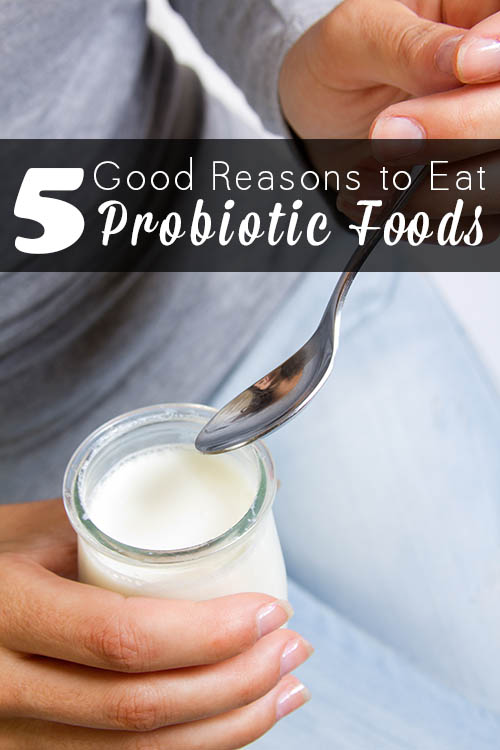A healthy gut means a healthier you, and probiotics can play a big part in balancing your gut flora. Here are some of the health benefits of probiotics.

Gut health has been a popular topic for natural healing folks for a long time, but in recent years it’s become a bit more mainstream– and with good reason. Researchers are now finding that gut health affects our whole body, and maintaining (or rebuilding) gut health is imperative for true wellness.
Related: Could probiotics help with the terrible twos?
Wellness advocate Kris Carr sums up digestive health like this:
“Your gut holds trillions of bacteria that help process your food, produce nutrients, and fight disease. In fact, there are ten times more bacteria in your gut than cells in your entire body! These little guys are super important and they need your help. Since what you eat, drink and think affects the environment in your gut, your daily choices play a critical role in whether those trillion plus bacteria help or hinder your well-being.
It’s all about balance when it comes to gut health. When your gut is in tip-top shape, about 80-85 percent of bacteria are good guys and 15-20 percent are bad guys. You feel great, your body is strong and nimble, you rarely get sick, your energy is consistent, you poop like a champ, life is good. The healthy bacteria are free to do their job with ease. They assist with digestion, produce disease-fighting antibodies, crowd out bad bacteria and produce certain hormones, vitamins and nutrients.”
Research shows that a balanced gut can help with many aspects of wellness. The New York Times notes that, “Bacteria in the gut produce vitamins and break down our food; their presence or absence has been linked to obesity, inflammatory bowel disease and the toxic side effects of prescription drugs. Biologists now believe that much of what makes us human depends on microbial activity.”
5 Health Benefits of Probiotics
Probiotics and a healthy, balanced gut can help with an array of symptoms.
1. Mental health: Scientific American shares that ongoing research makes it clear that our gut– our second brain– has a huge impact on our real brain. “The brain acts on gastrointestinal and immune functions that help to shape the gut’s microbial makeup, and gut microbes make neuroactive compounds, including neurotransmitters and metabolites that also act on the brain.” There is also a lot of work being done about the connection between gut health and autism. SA says that initial research in rodent studies show that autistic behavior might be rooted in the gut, rather than in the brain.
2. Anxiety: Huffington Post reports that when patients were given doses of prebiotics (food for the probiotics), they showed less negativity, less anxiety and paid more attention to positive information than a placebo group, and that those taking the prebiotics had lower levels of cortisol, the hormone linked with stress, anxiety, and depression.
3. Mood: The New York Times writes, “Our supply of neurochemicals — an estimated 50 percent of the dopamine, for example, and a vast majority of the serotonin — originate in the intestine, where these chemical signals regulate appetite, feelings of fullness and digestion. But only in recent years has mainstream psychiatric research given serious consideration to the role microbes might play in creating those chemicals.” Bacteria in our gut actually create these brain chemicals, proving they have a role in intestinal disorders and are correlated with depression and anxiety.
4. Brain function: Mercola shares research from UCLA that shows the connection between the brain function and the gut. Because the brain sends signals to your gut, stress is directly linked to digestive issues, and the opposite is true too. Patients with gastro-intestinal disorders felt new or increased depression and anxiety as digestive issues set in. The foods that we feed our body affects our gut flora too. Dr. Emeran Mayer says, “people with high-vegetable, fiber-based diets have a different composition of their microbiota, or gut environment, than people who eat the more typical Western diet that is high in fat and carbohydrates. [Now] we know that this has an effect not only on the metabolism but also affects brain function.”
5. Immunity: Dr. Mark Hyman writes on EcoWatch: “Your gut wall houses 70 percent of the cells that make up your immune system. You might not attribute digestive problems with allergies, arthritis, autoimmune diseases (irritable bowel syndrome, acne, chronic fatigue), mood disorders, autism, dementia and cancer. Many diseases seemingly unrelated are actually caused by gut problems.”
It’s becoming increasingly clear that probiotics are a link to better health in so many ways. The best thing about building your gut health is that it’s easy and pretty affordable since it comes from FOOD! Want to get more probiotic foods into your day-to-day? Start with these fermented superstars.
Excerpted from Green Living Ideas; eating yogurt image via Shuttestock







